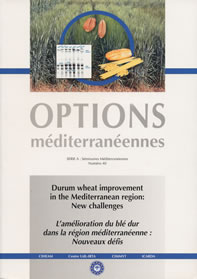| Article précédent | p. 447-454 | Article suivant |
Use of interspecific hybridisation in quality improvement of cereals
Martín L.M., Alvarez J.B.
The interspecific hybridisation has shown a useful tool in the breeding of cultivated species of Triticeae tribe. This technique has been mainly used for transferring some interesting agronomic characters as resistance to biotic and abiotic stresses, although has produced a loss of quality. However, the high variability detected for endosperm storage proteins in this tribe, together with other quality traits as the pigments content, could be used in quality improvement of cereals. We consider that H. chilense is a good example of this use, both as genes source for improvement of durum and bread wheat or tritordeum (amphiploid H. chilense-Triticum sp.).
- [ Afficher ]
- [ Télécharger ]
- [ Exporter la citation ]
Vous pouvez télécharger la citation au format :
- [ Imprimer ]
-
Mots-clés
BLE DUR, HYBRIDATION INTERSPECIFIQUE, PROTEINE DE RESERVE, QUALITECiter cet article
Martín L.M., Alvarez J.B. Use of interspecific hybridisation in quality improvement of cereals. In : Royo C. (ed.), Nachit M. (ed.), Di Fonzo N. (ed.), Araus J.L. (ed.). Durum wheat improvement in the Mediterranean region: New challenges . Zaragoza : CIHEAM, 2000. p. 447-454. (Options Méditerranéennes : Série A. Séminaires Méditerranéens; n. 40). Seminar on Durum Wheat Improvement in the Mediterranean Region: New Challenges, 2000/04/12-14, Zaragoza (Spain). http://om.ciheam.org/om/pdf/a40/00600073.pdf



